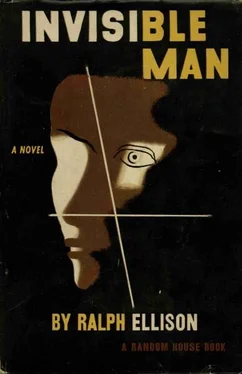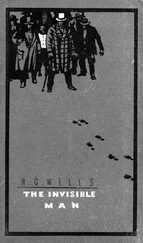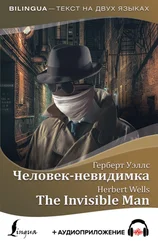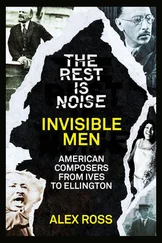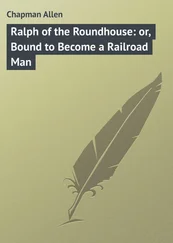Ralph Ellison - Invisible man
Здесь есть возможность читать онлайн «Ralph Ellison - Invisible man» весь текст электронной книги совершенно бесплатно (целиком полную версию без сокращений). В некоторых случаях можно слушать аудио, скачать через торрент в формате fb2 и присутствует краткое содержание. Год выпуска: 1995, ISBN: 1995, Издательство: Vintage Books, Жанр: Классическая проза, на английском языке. Описание произведения, (предисловие) а так же отзывы посетителей доступны на портале библиотеки ЛибКат.
- Название:Invisible man
- Автор:
- Издательство:Vintage Books
- Жанр:
- Год:1995
- ISBN:9780679732761
- Рейтинг книги:4 / 5. Голосов: 1
-
Избранное:Добавить в избранное
- Отзывы:
-
Ваша оценка:
- 80
- 1
- 2
- 3
- 4
- 5
Invisible man: краткое содержание, описание и аннотация
Предлагаем к чтению аннотацию, описание, краткое содержание или предисловие (зависит от того, что написал сам автор книги «Invisible man»). Если вы не нашли необходимую информацию о книге — напишите в комментариях, мы постараемся отыскать её.
The Waste Land,
Invisible man — читать онлайн бесплатно полную книгу (весь текст) целиком
Ниже представлен текст книги, разбитый по страницам. Система сохранения места последней прочитанной страницы, позволяет с удобством читать онлайн бесплатно книгу «Invisible man», без необходимости каждый раз заново искать на чём Вы остановились. Поставьте закладку, и сможете в любой момент перейти на страницу, на которой закончили чтение.
Интервал:
Закладка:
It's so long ago and far away that here in my invisibility I wonder if it happened at all. Then in my mind's eye I see the bronze statue of the college Founder, the cold Father symbol, his hands outstretched in the breathtaking gesture of lifting a veil that flutters in hard, metallic folds above the face of a kneeling slave; and I am standing puzzled, unable to decide whether the veil is really being lifted, or lowered more firmly in place; whether I am witnessing a revelation or a more efficient blinding. And as I gaze, there is a rustle of wings and I see a flock of starlings flighting before me and, when I look again, the bronze face, whose empty eyes look upon a world I have never seen, runs with liquid chalk -- creating another ambiguity to puzzle my groping mind: Why is a bird-soiled statue more commanding than one that is clean?
Oh, long green stretch of campus, Oh, quiet songs at dusk, Oh, moon that kissed the steeple and flooded the perfumed nights, Oh, bugle that called in the morning, Oh, drum that marched us militarily at noon -- what was real, what solid, what more than a pleasant, time-killing dream? For how could it have been real if now I am invisible? If real, why is it that I can recall in all that island of greenness no fountain but one that was broken, corroded and dry? And why does no rain fall through my recollections, sound through my memories, soak through the hard dry crust of the still so recent past? Why do I recall, instead of the odor of seed bursting in springtime, only the yellow contents of the cistern spread over the lawn's dead grass? Why? And how? How and why?
The grass did grow and the green leaves appeared on the trees and filled the avenues with shadow and shade as sure as the millionaires descended from the North on Founders' Day each spring. And how they arrived! Came smiling, inspecting, encouraging, conversing in whispers, speechmaking into the wide-open ears of our black and yellow faces -- and each leaving a sizeable check as he departed. I'm convinced it was the product of a subtle magic, the alchemy of moonlight; the school a flower-studded wasteland, the rocks sunken, the dry winds hidden, the lost crickets chirping to yellow butterflies.
And oh, oh, oh, those multimillionaires!
THEY were all such a part of that other life that's dead that I can't remember them all. (Time was as I was, but neither that time nor that "I" are any more.) But this one I remember: near the end of my junior year I drove for him during the week he was on the campus. A face pink like St. Nicholas', topped with a shock of silk white hair. An easy, informal manner, even with me. A Bostonian, smoker of cigars, teller of polite Negro stories, shrewd banker, skilled scientist, director, philanthropist, forty years a bearer of the white man's burden, and for sixty a symbol of the Great Traditions.
We were driving, the powerful motor purring and filling me with pride and anxiety. The car smelled of mints and cigar smoke. Students looked up and smiled in recognition as we rolled slowly past. I had just come from dinner and in bending forward to suppress a belch, I accidentally pressed the button on the wheel and the belch became a loud and shattering blast of the horn. Folks on the road turned and stared.
"I'm awfully sorry, sir," I said, worried lest he report me to Dr. Bledsoe, the president, who would refuse to allow me to drive again.
"Perfectly all right. Perfectly."
"Where shall I drive you, sir?"
"Let me see ..."
Through the rear-view mirror I could see him studying a wafer-thin watch, replacing it in the pocket of his checked waistcoat. His shirt was soft silk, set off with a blue-and-white polka-dotted bow tie. His manner was aristocratic, his movements dapper and suave.
"It's early to go in for the next session," he said. "Suppose you just drive. Anywhere you like."
"Have you seen all the campus, sir?"
"Yes, I think so. I was one of the original founders, you know."
"Gee! I didn't know that, sir. Then I'll have to try some of the roads."
Of course I knew he was a founder, but I knew also that it was advantageous to flatter rich white folks. Perhaps he'd give me a large tip, or a suit, or a scholarship next year.
"Anywhere else you like. The campus is part of my life and I know my life rather well."
"Yes, sir."
He was still smiling.
In a moment the green campus with its vine-covered buildings was behind us. The car bounded over the road. How was the campus part of his life, I wondered. And how did one learn his life "rather well"?
"Young man, you're part of a wonderful institution. It is a great dream become reality ..."
"Yes, sir," I said.
"I feel as lucky to be connected with it as you no doubt do yourself. I came here years ago, when all your beautiful campus was barren ground. There were no trees, no flowers, no fertile farmland. That was years ago before you were born ..."
I listened with fascination, my eyes glued to the white line dividing the highway as my thoughts attempted to sweep back to the times of which he spoke.
"Even your parents were young. Slavery was just recently past. Your people did not know in what direction to turn and, I must confess, many of mine didn't know in what direction they should turn either. But your great Founder did. He was my friend and I believed in his vision. So much so, that sometimes I don't know whether it was his vision or mine ..."
He chuckled softly, wrinkles forming at the corners of his eyes.
"But of course it was his; I only assisted. I came down with him to see the barren land and did what I could to render assistance. And it has been my pleasant fate to return each spring and observe the changes that the years have wrought. That has been more pleasant and satisfying to me than my own work. It has been a pleasant fate, indeed."
His voice was mellow and loaded with more meaning than I could fathom. As I drove, faded and yellowed pictures of the school's early days displayed in the library flashed across the screen of my mind, coming fitfully and fragmentarily to life -- photographs of men and women in wagons drawn by mule teams and oxen, dressed in black, dusty clothing, people who seemed almost without individuality, a black mob that seemed to be waiting, looking with blank faces, and among them the inevitable collection of white men and women in smiles, clear of features, striking, elegant and confident. Until now, and although I could recognize the Founder and Dr. Bledsoe among them, the figures in the photographs had never seemed actually to have been alive, but were more like signs or symbols one found on the last pages of the dictionary ... But now I felt that I was sharing in a great work and, with the car leaping leisurely beneath the pressure of my foot, I identified myself with the rich man reminiscing on the rear seat ...
"A pleasant fate," he repeated, "and I hope yours will be as pleasant."
"Yes, sir. Thank you, sir," I said, pleased that he wished something pleasant for me.
But at the same time I was puzzled: How could anyone's fate be pleasant? I had always thought of it as something painful. No one I knew spoke of it as pleasant -- not even Woodridge, who made us read Greek plays.
We were beyond the farthest extension of the school-owned lands now and I suddenly decided to turn off the highway, down a road that seemed unfamiliar. There were no trees and the air was brilliant. Far down the road the sun glared cruelly against a tin sign nailed to a barn. A lone figure bending over a hoe on the hillside raised up wearily and waved, more a shadow against the skyline than a man.
"How far have we come?" I heard over my shoulder.
"Just about a mile, sir."
"I don't remember this section," he said.
I didn't answer. I was thinking of the first person who'd mentioned anything like fate in my presence, my grandfather. There had been nothing pleasant about it and I had tried to forget it. Now, riding here in the powerful car with this white man who was so pleased with what he called his fate, I felt a sense of dread. My grandfather would have called this treachery and I could not understand in just what way it was. Suddenly I grew guilty at the realization that the white man might have thought so too. What would he have thought? Did he know that Negroes like my grandfather had been freed during those days just before the college had been founded?
Читать дальшеИнтервал:
Закладка:
Похожие книги на «Invisible man»
Представляем Вашему вниманию похожие книги на «Invisible man» списком для выбора. Мы отобрали схожую по названию и смыслу литературу в надежде предоставить читателям больше вариантов отыскать новые, интересные, ещё непрочитанные произведения.
Обсуждение, отзывы о книге «Invisible man» и просто собственные мнения читателей. Оставьте ваши комментарии, напишите, что Вы думаете о произведении, его смысле или главных героях. Укажите что конкретно понравилось, а что нет, и почему Вы так считаете.
